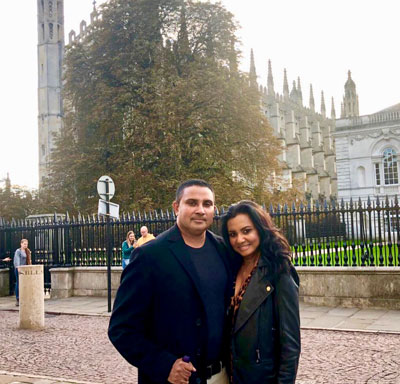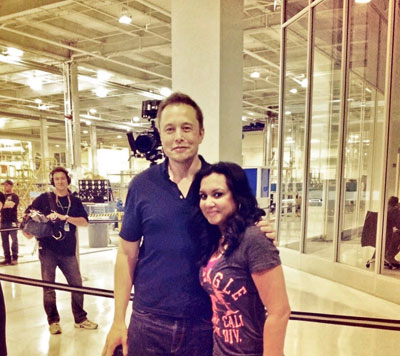There are things you can learn even from a pandemic

Melony Mahaarachchi
Melony Mahaarachchi’s favourite question in her MBA application was one on failure and learning. She wrote about how one day, she got stuck in SpaceX’s Cargo Dragon COTS-2 spacecraft while trying to fix a mistake. Months later, the very spacecraft she was trapped in, made history as the first commercial spacecraft docked in the International Space Station (ISS). The incident was one of lifelong learning.
The Sri Lankan-American moved to US in 2003 and attended university while caring for her two children who were three and five years old. She landed her first engineering job at Elon Musk’s SpaceX in 2010, worked at Boeing and then in 2015, went on to join the NASA Jet Propulsion Laboratory (JPL) to work on the Mars 2020 Rover mission. She was a member of the mission team for NASA’s Perseverance Rover, which launched in July this year, to seek signs of ancient life and collect rock and soil samples from Mars.
Melony had always wanted to study engineering. Her parents, however, thought medicine would be a better-suited profession as engineering was a largely male-dominated field and went against perceived cultural norms for Sri Lankan women at the time. The US tertiary education system doesn’t discriminate on age and she seized the opportunity to go back to school when she was much older than most students. Partly to fulfil this old, latent hunger. Partly because she was a hands-on mother and realized that she needed to be better equipped to assist her children’s education in the US.

Melony with her husband
“People ask me why I studied engineering – did I dream about becoming an aerospace engineer? Absolutely not. I grew up in a very middle class family and we didn’t have much. So how can I dream about things that I don’t know about? I didn’t know about aerospace engineering or anything in that aspect – so I never dreamt about it,” she explains matter-of-factly.
In a Zoom conversation with The Sunday Times, she spoke about her pandemic philosophy for this week’s edition of ‘Notes on Resilience’. Below are edited excerpts.
n How did the pandemic affect your work? How did you have to adjust?
While working in the aerospace industry, I was envious of those in the business division – how great their jobs were, meeting clients, travelling and even making decisions on innovative engineering projects. After a decade in engineering, I decided to apply for my MBA. I looked at an accelerated MBA programme and went to Cambridge Judge Business School last year. My two children were in college at that time – I realized that this was my opportunity to go back to school and make the career change I was looking for. So we moved to Cambridge, UK.
It was an exciting time for me because when I was an engineering undergrad student, I was a very young mom. My kids were young so I never got involved with any extracurricular activities. I went to lectures and came back home. I didn’t hang out with my friends so I missed bonding with my classmates. This was my second opportunity to embrace the college experience. UK and Cambridge has this rich culture and history and I really enjoyed the whole experience.
When the pandemic came in March, Cambridge University decided to take everything online. We came back to the US because our children were studying there. I soon realized most of the lectures are in UK time. My lectures started at 1 a.m. and went on till 9 in the morning. It was tough. My children came back because their schools were closed and they were also taking lectures online from 8 a.m. My husband started working from home and I was also a student, with project deadlines and assignments.
I have had many negative experiences in my career. And every time a negative experience happens I allow myself to be upset only for 24 to 48 hours. Because if you continue to be upset, you then upset the rest of your perfectly functioning side of life.

Melony with Elon Musk
Very quickly, I adapted. I learned how to not blame myself or the situation and to be resilient. The first week I was sleep-deprived and it seemed like 24 hours wasn’t enough. I realized that you can never do a perfect job with everything and you have to choose your priorities. I put down a weekly list every Sunday, prioritized and delegated, also bringing the entire family together. When setbacks happen, successful people quickly adjust to new norms. Having this agility is important. This was also a great life lesson to my children as they saw how our family worked as a ‘team’ taking on multiple responsibilities and owning the outcomes.
People also have to understand that screen fatigue is a real thing. Try to take breaks from the screen. While studying full-time I was setting up my company while talking to investors and other stakeholders. I have to adapt and translate the same energy I have in-person over a zoom call. This can be hard to do – in-person meetings have factors such as body language, space and other senses that play positive roles. With on-line meetings there are awkward pauses, awkward moments with your co-working space and at times you feel like people are reading off the screen which makes the interaction very robotic. Often, little things and good communication tricks can change the whole mood -try to bring that in-person energy to your online interactions.
What has your philosophy for 2020 been?
My husband and I are very outgoing people and are active and travel a lot. When the world came to a halt, we were, like everyone, initially upset and saw things negatively. But then we started looking at how the world is shifting because of the pandemic. When you see things differently, you see opportunities to grow. I always wanted to build my own business, learn new software, enhance my business knowledge, learn new cooking skills, reach out to friends and read. And what a great time for me to embark on these things.
Coursera (http://coursera.org/) and Udemy (https://www.udemy.com/) offer courses from well-known international universities for free or affordable rates, which you could take at your own pace. My father used to say that when there’s a catastrophe or a setback, it is a good time for people to invest in themselves. Understand this will be a missed opportunity for you to be better and be ready for new opportunities in the future.
Many think the virus is a phase you have to forget, that it is like a pause. But what if it is the phase that really propels you to do what you want? What if the virus is an opportunity for you to do whatever you have been thinking about? Maybe it’s entrepreneurship? Maybe you want to learn to make kithul hakuru, jewellery or home-made soap? Try to take the coronavirus period as a period that could propel you into the phase that you have always wanted to. My philosophy is, yes, I will accept that this is a negative situation but when you look at the possibilities in every situation, that’s when you become empowered. Being able to embrace what the pandemic brings is so important.
In a year of global uncertainty and upheaval, how have you found hope?
This uncertain time might make you feel like you’ll never come out of it positively. It’s easy to get mad with your partners, siblings, parents, or even children. You have to understand that it is a downtime not just for you but for everyone else too. Everybody is living, working, eating in the same place – even the dog (in my case.) Your house is now a co-working/co-living space and it was not equipped for that. There’s no separation between work and life.
But just imagine the amount of time you get to spend with your family. You always talk about work/studies taking over your time and now, you finally have time with your family – that is something I have really embraced. I am hopeful that going forward, the bond I strengthened with my children, and the new skills they learned will have a positive impact on their lives and the world around them.
My dad was an athletic, vibrant and intelligent man. This July, he suffered from a stroke and passed away within 24 hours. I saw the funeral over video streaming, but I don’t have closure yet. Not a single day passes by that I don’t think about my dad. I usually come to
Sri Lanka a few times a year to spend time with my parents but I am yet to hug my mother this year, to say how sorry I am for not being able to be there for her. Just like everyone else, my hope is that the pandemic will one day be over. I am hopeful to see my mother soon.
I’m also very hopeful of how advanced we are in science and technology. A lot of effort is going into getting a vaccine for COVID-19…… we are collaborative across the globe which gives me hope for post-COVID. Every individual ought to live with hope and I’m full of it.
Learning to embrace failures and build courage to accept, learn and grow from them, importance of team efforts, resilience and more importantly wearing humility as an accessory rather than a weakness, were lessons I learned from being trapped in a spacecraft. Imagine what a once-in-a-lifetime pandemic could teach us.


